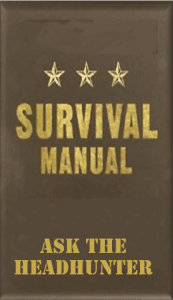Question
I’ve been working for a very dynamic manager who gives me lots of opportunities for advancement. I’ve learned a lot, but I think I blew it. The last three months have been very stressful and two days ago I quit. I left my boss in the lurch — I quit without notice. I was just burned out and didn’t know where to turn. He’s a great guy, but he just kept piling on the work and I got to the point where I couldn’t keep my head above water. Some tasks really required someone higher-level than me, but I managed to get them done, working till after midnight at home and on weekends. My husband and kids just learned to live without me for a while.
How do I explain my sudden departure to future employers? I do not just leave jobs, but I just didn’t feel capable any more. I know it was poor judgment to not give notice. Please help.
Nick’s Reply
 Sometimes stress pushes us to our limits. Sometimes it pushes us beyond. You’re right, you shouldn’t have quit without notice — or without first discussing your problems candidly with your boss. You will never know whether he might have adjusted your work load.
Sometimes stress pushes us to our limits. Sometimes it pushes us beyond. You’re right, you shouldn’t have quit without notice — or without first discussing your problems candidly with your boss. You will never know whether he might have adjusted your work load.
There are two things you should do.
Quit without notice: Fess up
First, you should go back to your employer, apologize, and offer to cover the job while he finds a replacement. That would be hard, I know. He may not even want to talk to you. Fessing up is the only way I know to try and salvage the relationship and your self-respect.
Second, face up to what happened when you interview with another employer. Whether or not your boss was being reasonable in piling on all that work, the bottom line is that the job and the company were not for you. You have to be able to explain, very briefly, why that’s so. Even if not speaking up was your error, your employer is at least as much to blame. Try something like this:
How to Say It
“I love my work, and I want to work in a better company where I am free to do my job effectively.”
If they ask you what the problem was with your recent employer, be honest:
“I’m looking for a good job with a good company, but I never disparage anyone I’ve ever worked with… I came to you because your company seems to be one of the shining lights in this industry, and I’d like to show you how I will be a profitable hire…”
Focus on the company you’re meeting with, not on your past or your old company. Be ready talk about what you can do for the new employer. That’s what matters. (See Stand Out: How to be the profitable hire.)
Lack of skills or too much work?
I’ve seen this burn-out syndrome before and it concerns me. You say you didn’t feel capable in the position you were in. I take that to mean you either weren’t skilled to do the job, or it was just too much work for you even if you could do it. Don’t let that get to your ego. There are jobs we can do, and others we can’t. Problems arise when we don’t know the difference, and when we can’t say stop before a disaster occurs.
I’ve known a number of talented people who have dug themselves into a hole they could not escape, except the way you did. It’s a vicious cycle.
Snapped and quit without notice
Sara was a very smart and dedicated worker who enjoyed great success at her company for three years. But she failed to recognize that the work became more than she could handle. The harder she worked, the more responsibility the boss gave her. Bosses are guilty of making this situation worse, because they often take advantage of this kind of worker.
Sara got deeper into the hole. She became physically ill. But she was afraid to turn any work away. Finally, she snapped. Late on a Friday she slipped a one-line resignation letter under her boss’s door and disappeared. She couldn’t face him, her co-workers, or herself. Her self-confidence was shattered.
Is this job for you?
This is what happens when someone takes on more than they can honestly handle. The truth is, the job is not for them, and burning themselves out trying to do it hurts everyone.
This message is not just for workers. It’s for bosses, too. If a job is too much for someone, stop and face the problem. Don’t create more problems by ignoring it till it’s too late.
My advice to you: find a job you want to do and that you can do well. Be honest with the interviewer, and focus on what you can do for the business. Interview your future boss thoroughly. Ask to meet other team members and inquire about the boss’s management style when there’s a crunch. Don’t ignore warning signs.
If you take the job, grow your career slowly and carefully, and base your success on the new skills you build – not on how much work you’re willing to take on to prove something. Let your boss know when the work gets to be too much. There’s a difference between “not doing your job” and “having too much job to do”.
I wish you the best.
Have you ever burned out and quit your job without notice to your boss? What precipitated it? What was the outcome? Do you believe it was your own fault, or your employer’s? What should this reader tell other employers?
: :




